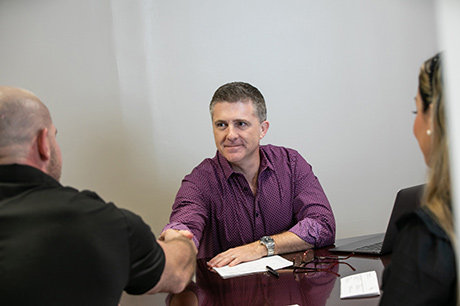Chapter 7 Bankruptcy
Your Chapter 7 Bankruptcy Lawyer Helps Relieve Debt
Chapter 7 bankruptcy is a legal process to have many debts forgiven, and it can put you on the road to financial recovery. If you’re considering this route, consulting with a bankruptcy attorney in Orlando is essential. By eliminating many of your debts, it still allows you to retain most, if not all, of your possessions. While no one wishes to file for bankruptcy, once initiated, there’s an automatic stay that prevents creditors from harassing you and seizing your belongings. A successful bankruptcy in Orlando will result in most consumer debts being discharged (forgiven), so you can begin to rebuild your credit and move forward with your life.
Too many people find themselves in a financial hole and unable to pay their debts, often through no fault of their own. Even the most responsible and hardworking people can suffer financial disaster if they are hit with unexpected health issues or laid off from their job and faced with tax issues or mounting student loan balances. Once you get behind, debts keep increasing, and you may find yourself being harassed by creditors, facing foreclosure of your home, or repossession of your vehicle. You are under tremendous stress and you don’t know where to turn.
 Fortunately, there is help available to get you out of this mess. A consultation with me can provide choices and solutions that will get you past this crisis and provide the fresh start you deserve.
Fortunately, there is help available to get you out of this mess. A consultation with me can provide choices and solutions that will get you past this crisis and provide the fresh start you deserve.
How do you know if bankruptcy is right for you? I will listen to your concerns and evaluate your individual situation to help you decide if bankruptcy is the best solution for you and your family. I have the knowledge, experience, and resources to help you get back on the road to financial recovery.
Florida Chapter 7 Bankruptcy Explained
The United States Bankruptcy Code Title 11 governs the procedures involved with filing for bankruptcy and provides several ways to file. There are also individual state bankruptcy laws that come into play. The most common types of personal bankruptcy are Chapter 7 and Chapter 13.
Chapter 7 Bankruptcy: will discharge (eliminate) most or all consumer unsecured debt such as credit cards, medical bills, and unsecured loans, so they no longer have to be paid. If your income is too low to pay credit card bills, medical bills, utilities, payday loans or personal loans, this may be the best option for you. Chapter 7 liquidates debt and allows you to surrender assets you do not want to keep, and it puts you on a firmer financial footing to move forward.
Chapter 7 bankruptcy is over in a few months, so you can begin rebuilding credit quickly. Often referred to as a liquidation bankruptcy, Chapter 7 can allow you to stay in your home while discharging credit card, medical and other debt. Florida bankruptcy exemptions protect many items that you own from being sold.
Who Qualifies for Chapter 7 Bankruptcy
In order to file for Chapter 7 bankruptcy, you must meet certain requirements. If you don’t meet the requirements for Chapter 7, you may still have the option to file Chapter 13 bankruptcy.
Income Limits: The primary factor is income. To qualify, your average income over the previous six months must be less than or equal to the median income for a household of your size in your state. You can find these figures on the U.S. Trustee Program website.
Means Test: If your income exceeds the state median, you may still qualify if you pass the “means test.” This complex calculation looks at your income, allowable expenses, and debt obligations to determine if you have enough disposable income to repay some of your debts through a Chapter 13 plan.
Individuals, businesses, and some partners can file for Chapter 7, though businesses don’t qualify for a debt discharge (only liquidation).
Factors that Might Disqualify You
Recent bankruptcy filings: You cannot file Chapter 7 if you received a discharge in a Chapter 7 within the past 8 years or a Chapter 13 within the past 6 years.
Debt types: Certain debts are not dischargeable in bankruptcy, like recent tax debt, child support, and student loans (except in rare cases of extreme hardship).
Fraudulent behavior: If you’ve tried to hide assets, transfer property before filing, or otherwise acted dishonestly, the court may deny your case.
What are Florida Bankruptcy Exemptions?
Florida does not recognize the federal bankruptcy exemptions, but has its own exemptions, which can be very generous. To qualify for the Florida bankruptcy exemptions, you must meet the residency requirements and be a Florida resident for no less than the last 2 years.
Here are some of the most common exemptions in Florida:
Unlimited Homestead Exemption
Covers properties such as your home, mobile homes, and burial grounds. There is no limit on the equity you can have on a house as long as you have owned the property for almost 3.5 years and it is no larger than ½ acre in the city or 160 acres outside the city.
Personal Property Exemption
Certain personal property items, such as furniture, art, and electronics, are exempt up to $1,000. There is also a “wild card” exemption you can use if you do not use the homestead exemption. (FL 225.25), which increases your personal property protection from $1,000 to $4,000.
Other personal property items that are exempt include:
- Education savings, health savings, and hurricane savings
- Prescribed health aids, health and medical savings accounts
- Earned Income Credit of your tax refund
- Funeral costs
- Particular partnership property
- Pensions and retirement accounts
- Public benefits
- Alimony and child support
- Insurance policies and annuities
Motor Vehicle Exemption
Up to $1,000 in equity on your motor vehicle can be exempted, and if you are married and filing jointly, this amount is higher.
Wage Exemption
If you are the head of the household, your wages will be exempt up to $750 per week or 30 times the federal minimum wage.
Federal Nonbankruptcy Exemptions
There are certain federal exemptions that are allowed in Florida, called federal nonbankruptcy exemptions for professions such as the military, government, or individuals who receive Social Security. These include:
- Retirement benefits
- Death or disability benefits
- Survivor’s benefits.
Exemption amounts change periodically, and if you do not own a great deal of property, your possessions may be all be exempt, qualifying you for a “no asset” case. I will examine your situation to identify the exemptions most favorable to you: (407) 749-0080.
Chapter 7 Bankruptcy Attorney Answers FAQs
When faced with filing for bankruptcy, you are bound to have many questions. These are best addressed at your initial consultation, but to get you started, here are some answers to questions I am often asked:
To determine if you are eligible for Chapter 7 bankruptcy protection, your income and debt will be subjected to something called a “means test.” Your average income must be below the state’s median income for your household size, and this amount changes periodically.
Yes, these are called “nondischargeable debts” and may include:
- Child support
- Most student loans
- Certain tax debts
- Debts incurred through fraud or theft
While bankruptcy may not relieve you of every debt, it allows you to discharge medical, credit card, and several other forms of consumer debt, which makes it easier to pay nondischargeable debts that remain.
Chapter 13 is another frequently used type of consumer bankruptcy: This is a repayment plan where your debts are consolidated so you can repay some or all of them affordably over a three- to five-year period. This plan is best for people who don’t qualify for Chapter 7 and who have a steady income, temporary financial problems, and a desire to repay some of the debt in order to keep an asset such as a car or a house.
No. After filing your bankruptcy petition, you will be required to attend a hearing called a First Meeting of Creditors where a bankruptcy trustee asks you questions about your bankruptcy papers and financial situation, and creditors are permitted to do so as well. I will prepare you and accompany you to this meeting. But the good news? This meeting is over the telephone. It is very rare for a client to ever appear in person in court during their case.
Secured debt is debt that is backed by property used as collateral, like a car or a house. Should you default on the loan or debt repayment, creditors can take the collateral instead.
While bankruptcy filing typically involves court and lawyer fees, I will work out an affordable way to manage the cost. Most people are able to afford my fees by no longer making credit card payments they were struggling to manage. In addition, after successfully discharging your debts, you will wind up in a much better position than you were in before filing to start rebuilding your credit.
When you have me on your side, I will be there to answer all your questions as they come up.
What’s Included in Our Chapter 7 Bankruptcy Legal Services
Once you retain me, I will start working for you immediately. I will:
- I meet with you to discuss your debt situation and determine which type of bankruptcy or other debt relief solution may be best for you.
- I examine all your finances and assets to see what exemptions you may qualify for to protect your property and what will happen to property you cannot exempt.
- I file all paperwork promptly and attend all court appearances in accordance with state and federal bankruptcy law.
- I am there for you to answer questions and ensure you meet all requirements (such as credit counseling) so your bankruptcy can be completed and your eligible debts discharged.
Do not delay, as your debt situation can only get worse if not addressed. Take the first step to start working toward a brighter financial future today: (407) 749-0080
Everyone’s’ financial situation is different, but I will work with you by looking at your income, your debts, and your goals to make sure you know all your options and determine whether Chapter 7 or some other debt-relief solution is best for you.
Call me today to get started on the right path to a brighter future.

